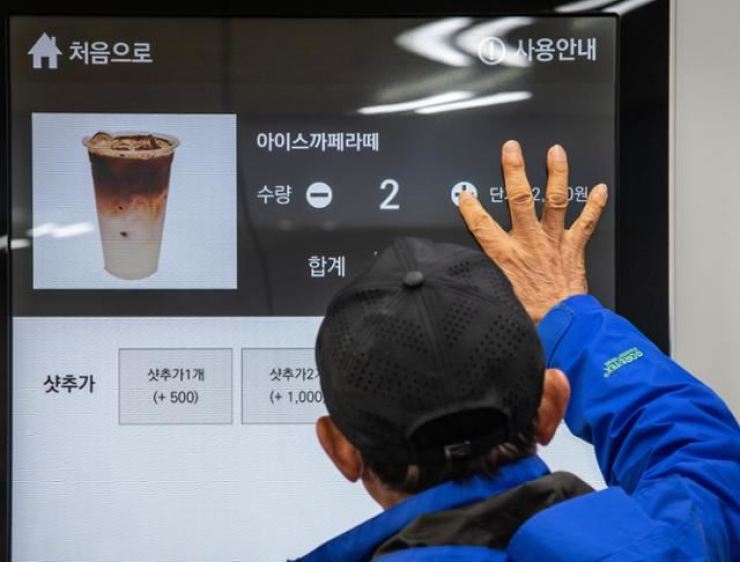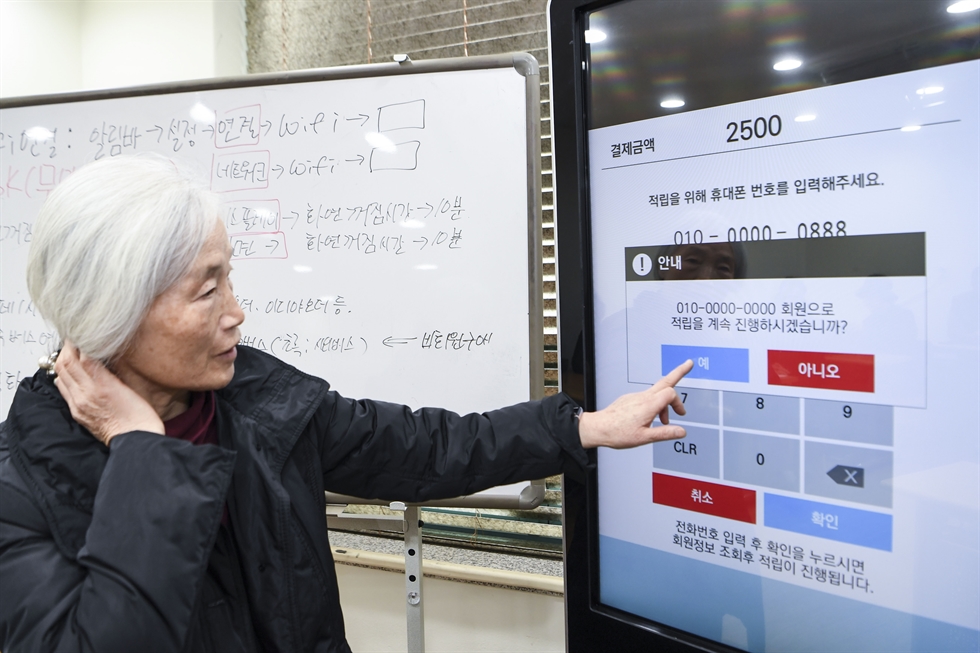Every holiday season, elderly Koreans visit train stations to purchase tickets in person, but it has become increasingly common for all train tickets to be sold out through applications before they get a chance to make a purchase. Additionally, many elderly individuals struggle with kiosks in stores that have replaced traditional in-person ordering methods. The rapid advancement of technology has brought about a swift digitalization of our society, posing new challenges for digital novices, including the elderly, who struggle with digital platforms.
 |
| ▲ Korean Elderly Having Difficulty Using Kiosk (Photo from TheKoreanTimes) |
The term "digital illiterates" generally refers to the population aged 55 and older who are vulnerable to advances on the Internet. The MZ generation, born after the 1908s, is closely connected to digital media due to growing up alongside the technological explosion. However, research suggests that the digital proficiency of previous generations lags behind because they had to learn to use it independently. As digitalization gradually accelerates, the problem of digital illiteracy is becoming more rampant. This year’s Lunar New Year holidays saw the Korea Railroad Corporation (Korail) conduct online reservations a month earlier than the holidays through the Korea Railroad Corporation’s mobile application 'KorailTalk' and website 'Let's Korail.' To prevent the exclusion of digitally vulnerable groups, such as the elderly and disabled people, Korail secured 20 percent of seats for the transportation vulnerable and provided a separate pre-booking opportunity from January 8 to 9. They also provided the convenience of 10 percent of seats being allocated by telephone and internet reservation counters separately. Despite the efforts made, every step in the process, from obtaining information to making online reservations, was a difficult task for the digitally vulnerable. In addition, when trying to obtain a copy of their resident registration, people familiar with using the internet had no problems securing the document online for free. However, the elderly who have difficulty using the internet were forced to visit the community service center and pay a 400 won fee to get it. This incurs additional costs and time for the vulnerable. Furthermore, individuals lacking digital proficiency might experience inconvenience in many aspects of life, such as hospital reservations that rely on using apps, ordering from kiosks in stores, and ordering delivery food through apps.
 |
| ▲ Senior Citizen Learning How to Use Kiosk (Photo from Thekoreantimes) |
The digital divide causes many inconveniences in daily life. Economist Hal Varian revealed that the digital divide is polarizing the economy. This is because using digital technology to quickly search for and obtain information saves both time and money. Since the digital underprivileged cannot use these technologies, there is a risk that they will be alienated from society in the future. As of 2024, the pace of development of digital technology is increasing. The digital divide is affecting education, the economy, and jobs, and overcoming this problem is not expected to be easy. With the rapid aging of the global population, governments, including local governments, should strengthen digital literacy education and improve the convenience of digital devices so that the elderly and the digitally underprivileged do not hesitate to use digital technology. The Seoul Metropolitan Government has implemented a “digital guide” system as a strategy to bridge the digital gap. This program assists the digitally underprivileged by providing guided tours of multi-use facilities commonly frequented by the elderly, including train stations, subway stations, and supermarkets. It guides them on how to use kiosks and make smartphone reservations. An estimated 167,000 citizens received help over the past year through digital guides. To increase the convenience of using digital devices, the three mobile carriers offer free training on how to use them in stores. Regardless of the carrier, anyone who visits the stores during opening hours can receive the training. A Seoul Metropolitan Government official mentioned, "We will continue to carry out related services for the underprivileged and will make efforts to expand the scope of the services to collaborate with private companies."
 |
| ▲ A White Kiosk (Photo from Unsplash) |
In an interview with Professor Lee Ji-sook from the Dept. of Social Welfare at Dankook University, we uncovered some novel perspectives on the digital divide. Contrary to the common association of digital vulnerability exclusively with the elderly, Professor Lee highlighted that the digitally disadvantaged encompass a wider range of demographics, including the elderly, economically vulnerable groups, and persons with disabilities. She pointed out that the digital divide could lead to limited access to information, everyday inconveniences, and experiences of social discrimination or exclusion. The root cause of the digital gap, according to her, lies in the disparities in education and income, which are indicative of broader societal polarization. While the elderly are commonly perceived as digitally vulnerable, mainly due to difficulties in using kiosks or smartphones, she noted that this characterization is not comprehensive and called for further research to fully understand the various facets of the issue. There are ongoing efforts, such as education programs at senior wellness centers focusing on kiosks and digital devices, but these services are currently reaching only a limited audience. Expanding such educational initiatives appears to be a necessary step. Lastly, she said that Korea may be among the first countries to encounter and address digital-related social issues. Given its unique position, it may be imperative for Korea to investigate and provide solutions to the digital divide for other countries, particularly in cases where age- and environment-based personalized education support is required.
As the population ages, a growing number of the elderly are at risk of digital exclusion due to limited digital literacy, which presents a significant challenge. For society to progress towards a better future, it is necessary to explore ways to support digital novices and move forward together.
박상우, 배서연, 박지윤, 홍채연 dankookherald@gmail.com

 Vote for the Campus Brand Naming!
Vote for the Campus Brand Naming!

![[Campus Magnifier] Let's Surf the Library!](/news/thumbnail/202404/12496_1765_4143_v150.jpg)




